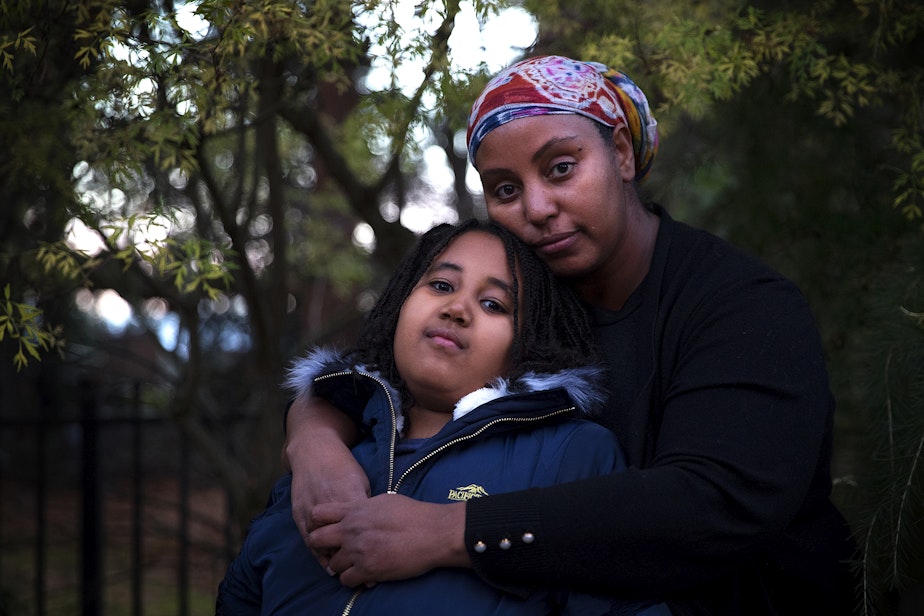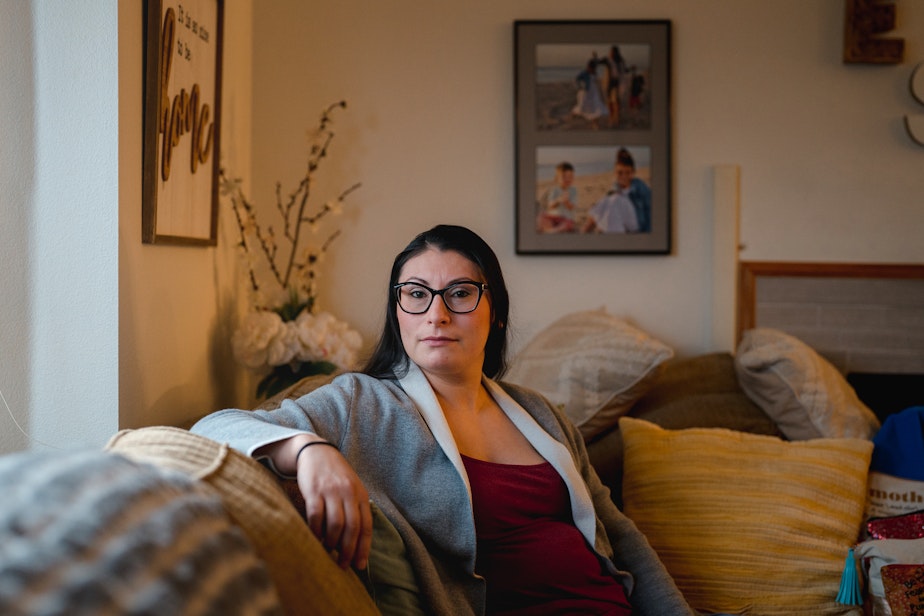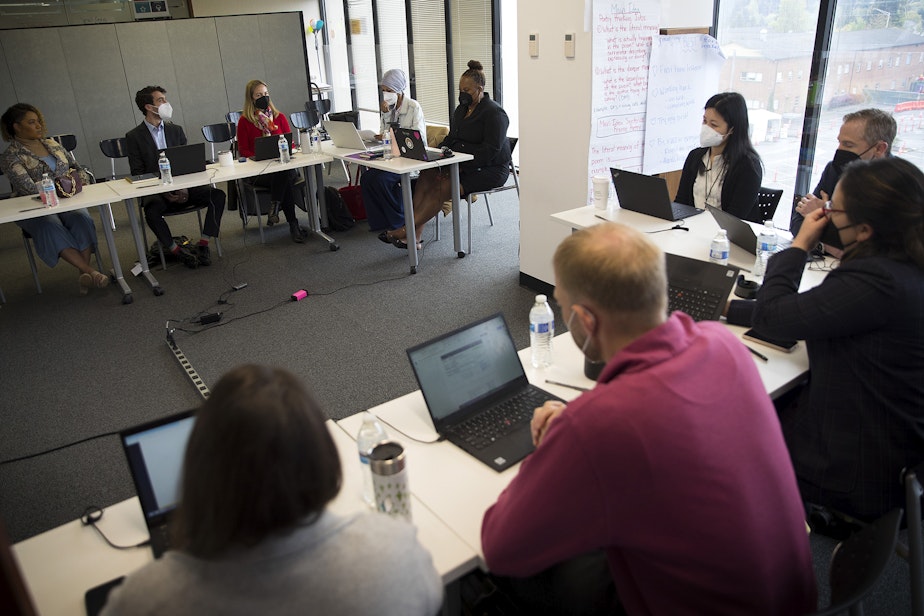'Where is the accountability?' for WA's largest charter school chain, ask parents and staff

This is the third story in Broken Promises, an investigative series about Impact Public Schools, the largest charter school chain in Washington state.
In 2012, after three previous failed attempts and an $11 million campaign, Washington voters narrowly approved charter schools. The promise was that these publicly-funded, privately-run K-12 schools would offer innovative options for students who may struggle in traditional public schools, including some students of color, children with disabilities, and students learning English.
Although charters would be granted more flexibility and freedom than other public schools, backers pledged that they would also be subject to strict oversight, including annual performance reviews for each school.
That accountability is lacking for the state’s largest charter school chain, Impact Public Schools, staff and parents told KUOW, and the students most affected are also the schools’ most vulnerable.
Over seven months, KUOW interviewed 50 current and former Impact staff and parents, and reviewed thousands of pages of documents from Impact and state agencies, including enrollment records, staff resignation letters, court records, charter contracts, nondisclosure agreements, and internal emails.
KUOW’s investigation revealed a charter school chain that state officials have allowed to grow rapidly even as, staff allege, it failed to identify and serve students with disabilities, offered little to English language learners, and where crowded classrooms are largely led by inexperienced teachers without the usual credentials. Many students were recommended to repeat a grade based on test scores.
Records show that staff members and parents have, for years, taken their complaints about how Impact serves students to the many agencies assigned to oversee charter schools. They emailed the Impact board of directors, testified to the Washington State Charter School Commission, and reported concerns to the State Auditor's Office. Little, if anything, came of their efforts, they said.
After Impact's first school, in Tukwila, opened in 2018, the state approved new branches in Seattle, Tacoma, and a Renton location set to open next year.
As the state’s charter school law requires, Impact promised to focus its mission on marginalized students, and its demographics reflect the communities around its schools.
Sponsored
The charter chain’s students are mostly children of color from low-income families. Black students make up the largest percentage, including many from East African immigrant and refugee families. Twenty-one percent of students are learning English, state records show.
Jen Davis Wickens, Impact Public Schools co-founder and CEO, declined multiple interview requests for this story and agreed only to respond to emailed questions via a spokesperson.
Impact spokesperson Rowena Yow said by e-mail that the state’s primary K-12 education agency, the Office of Superintendent of Public Instruction, “conducts a thorough annual audit of our [special education] program and services, and we have received approval since our inception in 2018.”
“Our special education program meets the highest standards,” Yow said, adding that the same is true for its English language learner program for the schools’ large number of students from immigrant and refugee families. Twenty percent of its students are learning English, state records show.
Sponsored
Chris Reykdal, the superintendent of public instruction, said his agency has relied entirely on what Impact claimed that it provides to special education and English language students.
“Most of what we do is ask districts to make attestations about their use of funds,” Reykdal said.
“Periodically, the state auditor will do a deep dive on a performance audit. But that's very, very rare, especially for a new school.”
Reykdal said his agency oversees so many school districts that it often takes a complaint from the community to trigger the agency to take a closer look at school practices. As of March, when Reykdal was interviewed for this story, he said his agency had not received complaints about Impact’s special education and English language services.
Reykdal said that if Impact is not meeting its obligations, as parents and staff allege, “that’s alarming.”
Sponsored
The State Auditor’s Office has a significant lag time in completing school district audits — often two or more years — which means issues are often caught only in hindsight.
To date, the agency has issued one audit report for an Impact school, the Tukwila location: it reviewed the 2018-19 school year, its first in operation. That accountability audit looked at a handful of standard items, including whether the school had accurately classified students as needing special state-funded services, like English language lessons. The audit did not look into whether those services were actually provided.
With so many layers of oversight, the roles and responsibilities for each of the many agencies tasked with overseeing charters can be murky — both to the public, and to the agencies themselves.
Few of the 29 Impact parents KUOW interviewed pursued formal complaints regarding their concerns about how Impact schools run. More often, after raising issues at the school level, they gave up — or withdrew their children and enrolled them in their neighborhood schools.
Several Impact parents told KUOW there was no clear way to file a complaint about their concerns with the school — the website gave no clear path. Two said their emails to Impact’s public records address bounced back.
Sponsored

An extra layer of state oversight
T
he eight appointed members of the Washington State Charter School Commission authorize new charter schools, renew or revoke schools’ charter contracts, and are meant to ensure schools follow the law and their contracts.
Sponsored
The agency has a staff of six and a $1.8 million annual budget — money that comes almost entirely from fees paid by the charter schools it oversees. Because each school pays 3% of its state funding to the commission, the agency’s budget is directly tied to charter school enrollment.
Each additional school the commission approves — and each student who enrolls at that school — grows the commission budget. Conversely, if the commission limits a school’s growth, or revokes a school’s charter contract, the commission’s budget takes a hit.
Impact Public Schools paid the commission approximately $485,000 in fees this year, more than any other charter school or network, and about one-quarter of the agency’s budget.
The commission is supposed to produce annual reports on each charter school, as voters were promised: their academic success compared to traditional public schools, as well as the schools' financial and organizational stability. The commission has not completed a charter school performance report since the 2018-19 school year, three school years ago.
Commission Interim Executive Director Jessica de Barros said the commission is waiting on reports from the State Auditor’s Office in order to finish the 2019-20 school year performance reports.
The commission periodically visits charter schools to observe classes and interview staff and parents. But teachers told KUOW that the commission gives the school significant control over the narrative, providing schools with questions commissioners may ask staff.
When the commission visited Impact’s Tacoma school, Commencement Bay Elementary, in late April, Impact prepared each staff member with the commission's list of questions, and four pages of suggested answers — including how staff handle students with possible learning disabilities, and even answers to matters of opinion, like the school’s strengths and weaknesses.
In May 2020, former Impact teacher Claire Leong wrote to the Charter School Commission, imploring the agency to deny Impact’s efforts to add another two schools to its network.
Leong said the disciplinary system at Impact’s Tukwila school had been “abhorrent,” and that teachers were required to send students to another classroom after several minor infractions.
“This could be not looking at the speaker, not sitting up straight, not walking silently,” Leong wrote. “My students often missed learning time because of these marks, and were instead in a buddy class or with the admin team,” Leong said, adding that Black boys missed the most instruction.
“Impact Public Schools should not be allowed to open any more schools, and should have their current school audited to highlight the discrepancies between the values that they tout and the malpractice that is occurring when no one is there from a foundation or commission to see everyone on their best behavior,” Leong told the commission.
Several Impact staff and parents also testified in support of the school expansion.
Several weeks later, the Charter School Commission gave Impact the green light to open new schools in Tacoma and Renton.
When asked why the commission allowed Impact to open more schools despite serious concerns voiced by parents and staff, Commissioner Christine Varela, who serves as the agency spokesperson, said that the commission is required by state law to base its decisions for new schools “on documented evidence collected through the application review process.”
RELATED: A Seattle-area charter school's controversial approach to hold students back
Varela said that “to deviate from the process would open the agency up to potential protest from the applicant organization and potential litigation.”
Impact parents said when they have complained to the commission, the commission often directed them to instead raise their issues with Impact’s board of directors.

A different kind of school board
U
nlike traditional public school boards, which are elected by local voters, Impact’s board members are appointed.
When parents wrote to the board, they said board members often told them to complain instead to Impact co-founder and CEO Jen Davis Wickens, to voice their concerns during public comment at a board meeting, or to file a formal complaint with Impact.
Speaking during public comment at a board meeting can be difficult, because the meetings occur during work hours. It can also be intimidating for parents at Impact schools, said Jimmy, a parent at its Tukwila school — especially for its many immigrant and refugee families. He asked to use only his first name to protect his child's privacy.
“Our voice is small,” Jimmy said. “English is our second language. If we want to say something, it’s hard, you know?”
At six Impact board meetings KUOW attended over the past seven months, unanimous approval of all agenda items was the norm, with little, if any, discussion. Meetings are typically over in 30 minutes.
Impact board members declined or did not respond to interview requests for this story, or to address any of the issues raised by parents and staff that KUOW shared with the board.
Although few people know more about the charter network than its staff, many former Impact educators told KUOW they were afraid to speak up with their serious concerns about the schools because they had signed non-disclosure agreements.
Impact has most departing staff sign an agreement barring them from sharing any information that "may cause harm to the employer."
Some staff sign more stringent agreements that ban them from making "disparaging" remarks about Impact or divulging the reason for their resignation.
"Employee will simply state 'I decided to pursue other opportunities,' or something similar, and will make no further comment," an Impact severance agreement reads.
Asmeret Habte, whose children, nieces, and nephews attended Impact's Tukwila location this year, contacted the school, the board, and the state Charter School Commission about concerns about overcrowded classrooms at the school last fall.
As many as 38 students per class were eating at shared desks in one of the most Covid-affected areas in the region, and Habte and other parents worried the school was not doing enough to mitigate risk.
Krystal Starwich, then the commission’s interim executive director, told Habte that while the commission would ask Impact some questions, parents should go through their school’s established complaint and appeal processes.
Habte eventually gave up, and unenrolled her children from Impact. "Where is the accountability?" she asked. "There is no accountability, even though it's public dollars" that fund Impact Public Schools, she said.
“I mean, we did set up a completely parallel system to the public schools here in terms of governance," said Chris Reykdal, at the state schools office.
“I think it's ripe for the Legislature now to come back and say, ‘Do we need this much bureaucracy surrounding the governance of one sector?’” Reykdal said.
Reach Ann Dornfeld at adornfeld@kuow.org or 206-486-6505.




